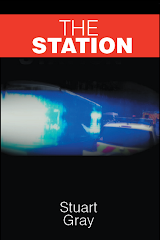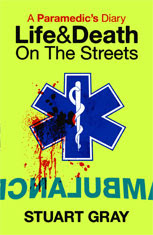Rapid Sequence Induction (RSI) is carried out in emergencies where there is a need to quickly intubate a patient in order to preserve their airway and lungs. It's also useful when a patient is combative after head trauma.
I didn't think I was going to get to this call. It was in an area that I normally get cancelled down on before I arrive. The call was for a 'car v pedestrian' and when I got on scene there was a crew already in attendance; a paramedic and an EMT. They were working around a large male who looked either unconscious or dead in the road. I got closer and was told by the paramedic that he had been unconscious since being hit by a car at an unknown speed a few minutes earlier. A Delta Alpha (our term for a rapid response doctor) had been called.
The man had sustained a head injury and we could find no other significant obvious injury to the rest of his body. His neck was stabilised and an Oropharyngeal Airway (OP) had been inserted to keep his tongue from obstructing his airway. He was breathing and he had a strong pulse but when I lifted his eyelids to check his pupils his eyeballs were rolling from side to side, a sign of possible brain injury. He also had blood coming from his left ear, so a basal skull fracture was likely. The guy was in serious trouble.
We got him into the ambulance and began to gather all the information we needed for our baseline obs. His breathing was unpredictable (shallow then deep) and he needed assistance with a bag-valve-mask while I got on with getting a couple of cannulas into his arms. I knew that the doctor was going to RSI this patient and so we prepared him for the routine.
When the doctor arrived all four of us had a specific role to play in preserving this patient's life and that began with induction. Just prior to the doctor administering the drug to put the patient to sleep, the injured man had started thrashing about (no doubt the oxygen was waking his brain up a little). When the drug was given he went to sleep. A muscle relaxant, which effectively stops him breathing for himself, was then given. He had to be intubated immediately after this in order to preserve his airway. He also had to be 'bagged', or ventilated to keep him breathing. After all the drugs had been given and he had been put up on fluids, his condition stabilised and he was ready to go to hospital.
I got in my car and led the ambulance as rapidly as possible to hospital. At that time of night I used the vehicle to clear a path for the ambulance, thus helping to ensure a smooth ride for the patient and those in the back with him.
We got him into resus and he was quickly taken for a CT scan. His chances of survival should be good and I will try to follow up on his progress for you if possible.
This was a team effort and I enjoyed it. Most calls are routine but every now and then a job like this reminds you of why you got involved in pre-hospital care in the first place.
Earlier in the evening I was called to a young man who had been robbed and stabbed in the back of his thigh for good measure. The assailants had also tried to stab him in the chest but he had moved to avoid the blow. I can't believe how dangerous these people are. Stabbing him in the leg was bad enough - that stopped him from resisting I'm sure but to try and finish him off for the price of a mobile phone and a few quid? Time to bring back REAL punishment for these crimes.
Another assault later in the night. This time an elderly man was punched around the face and head as he entered his own premises. The assailant had been following him and tried to rob him as he went into his home. I guess the drug addicts in town had heard that a clearance sale was on.
And my funny moment of the night came when I watched a gang of girls on a hen night barge into a cinema, forcing their way past the staff and into one of the theatres to do God-knows-what to the men watching the movie! They were ejected by the female members of staff. The blokes just stood there with stupid grins on their faces, until they were told off by the woman in charge. Hen night gangs are dangerous. Cross the road if you see one coming.
Be safe.
Subscribe to:
Post Comments (Atom)















3 comments:
Yes, sometimes they are put to sleep when conscious, especially if they are combative. We, however, do not carry or use these drugs, the HEMS doctors and DA's do.
And hopefully in a few (*ahem*) years time that's the sort of work I want to be doing.
Thanks for the link, I just spotted it!
I think your work is wonderful.
Sarah
Post a Comment